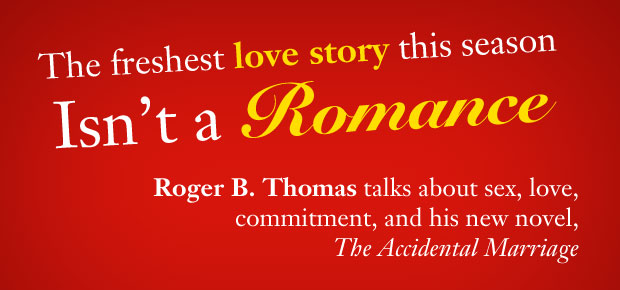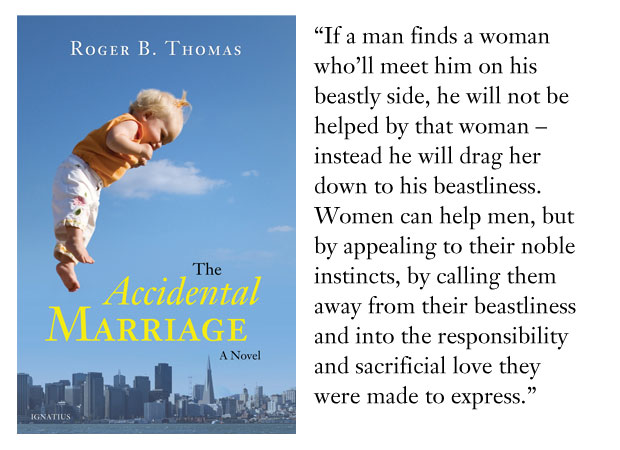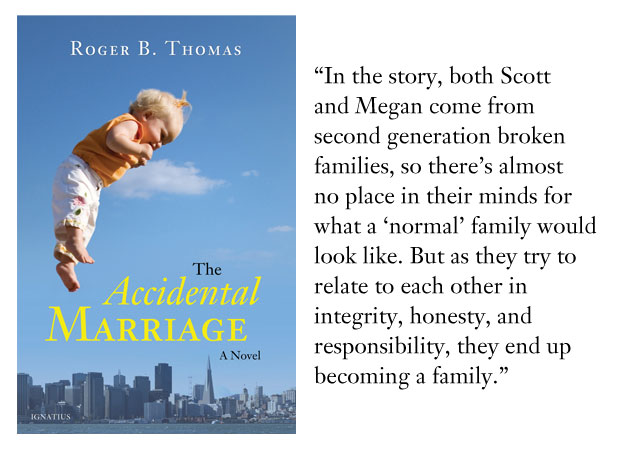
In the wake of the Extraordinary Synod on the Family, there has been a renewed interest in talking about marriage and family—especially marriages and families that are in irregular situations. In Roger Thomas’s new novel, The Accidental Marriage, he traces a coupling that follows a highly irregular path.
Scott and Megan are both involved in separate same-sex relationships. When Megan and her lover decide to have a child, Scott offers to help. But after Megan is abandoned, Scott comes up with an unconventional plan to help her in her time of need. As the two begin to mutually sacrifice their own desires to help one another, their friendship deepens.
Ignatius Press Novels talked with Roger via e-mail. You can find a previous interview with him here.
You’ve described your book as being a love story, not a romance. What’s the difference?
Thomas: There are many types of love, a topic covered masterfully in the classic The Four Loves, by C.S. Lewis. Romantic love, eros, is only one of them. There are also friendship, familial love, the kind of camaraderie that’s found when people are thrown together for a purpose, such as being shipmates. In The Accidental Marriage, the foremost type of love exhibited is friendship. This leads Scott and Megan to do some interesting things, some of which aren’t normally part of a friendship, but all that arises from the assumptions they’re making about the nature of life and human relationships. But the love they have is genuine, and ends up demanding a lot from both of them, even if it doesn’t fit the cultural concept of “being in love”.
Romance novels are immensely popular, including among Catholics and Christians. Some of these books, such as Fifty Shades of Grey, are obviously problematic for a whole host of reasons. But even more “chaste” romance novels and movies carry messages of “one true love” that seems to emphasize emotional satisfaction over a more sacrificial understanding of relationships. What ideas from this genre are ones that you think are harmful?
Thomas: I recently learned that there’s a whole sub-genre of books, mostly published by Christian publishing houses, known in the trade as “bonnet fiction”. These are romances set either a few generations back, or somewhere like Amish country, and thus are free of any hint of modern licentiousness. But even without any sexually explicit material, there’s still a danger to these stories. I remember being amazed when, a few decades ago, I was at a conference and a woman minister stated that romance novels can fill the same role for some women as pornography does for men. I asked my wife and she confirmed it, pointing out that even though the images are verbal instead of visual, the function is the same: creating false images to distract people from the reality they have to deal with in everyday life. Today there are lines of romance novels that have incorporated sexually explicit content, becoming in effect soft core pornography. But I think the core allure remains the same, whether the characters are wearing bonnets or nothing: the creation of a false reality in which the readers can live and indulge in fantasies about people and how they react.

Let me give an example. I’ve not read the Fifty Shades books and don’t intend to, but from the plot synopses they seem like a variation of a common theme in romance novels, the “Beauty and the Beast” motif. In these, there is some troubled man who just needs the love of a good woman to redeem him from himself. The man is often shown as having a beastly side and a noble side, and may have had very immoral relationships with other women, but in the story, by virtue of True Love, the heroine manages to eventually appeal to his noble side, even if she has to accommodate his beastly side along the way.
This theme represents a false understanding of human nature. I am a man who has dealt with men all my life. There’s a certain accuracy to the idea that we have a beastly side and a noble side, but I can assure all woman that the way to help us men isn’t by accommodating our beastly appetites. If a man finds a woman who’ll meet him on his beastly side, he will not be helped by that woman – instead he will drag her down to his beastliness. Women can help men, but by appealing to their noble instincts, by calling them away from their beastliness and into the responsibility and sacrificial love they were made to express.
This is where The Accidental Marriage differs. It isn’t a romance; Megan doesn’t set out to “redeem” Scott in any way. They’re two friends thrown together by circumstances which force Scott especially to step up to responsibility and duty in a way he has never had to before. Scott responds from his noble side, but the only pressure he feels is internal. In this, I’ve hoped to create a story that reflects how people actually are, rather than how we’d like them to be.
At the recent Extraordinary Synod on the Family, there was much controversy and discussion about some of the proposals regarding same-sex couples, divorced and remarried couples, and persons with same-sex attraction. Some critics believed these proposals showed a preoccupation with the symptoms of what is a deeper underlying problem—to quote the authors of the recent Ignatius Press book The Gospel of the Family: “If there is a pandemic, either you attack the hotbed of the infection or else any treatment will be useless.” What do you think the underlying problem is?
Thomas: I think people need to read more Peter Kreeft. He’s especially good at reminding us that this world is only a training ground, a “saint factory” that prepares us for the Real Life that is to follow: the Resurrected Life with Christ. Because we’ve lost sight of the fact that our life in this world is only temporary, we tend to seek all our gratification here. You see this expressed in slogans like, “Don’t let life pass you by!” and “You only live once!” This “flattened” view that looks no further than our earthly existence lends a measure of desperation to our view of life. What if we’re stuck in a dead-end job (or marriage, or town, or whatever)? Are we wasting precious minutes of the only life we have? This drives people to grasp at things that promise greater satisfaction, leading people to divorce and remarriage, to premarital sex, to abandoning loved ones so they can “follow their dreams”, breaking what prior generations would have considered inviolable oaths.
If you were to look for the hotbed of the infection, this is where I’d start: not only by helping people to understand not only that this life isn’t our only chance, but also that it’s a preparation ground for real life, and the choices we make here can influence the real life that we’re training for.
Are there things Catholics can do to be more understanding of those with same-sex attraction?
Thomas: When it comes to sensitively interacting with people struggling with SSA, there are many better people to ask than me. The only thing that seems obvious is to recognize that they’re just as human as anyone else, and should always be treated with dignity and respect. That was one of my hopes with the story, to help readers recognize that we all share the same struggles, hopes, dreams, and longing for love.
What makes the discussion difficult in our culture is that there are certain parties that are looking not simply for acceptance, but for full-throated affirmation – not just of homosexual acts, but of other behaviors as well (divorce and remarriage springs to mind). It’s hard to know how to express love toward someone who insists that if you don’t tell them their behavior is sinless, that makes you a “hater”. But to the degree we can, we should treat people with dignity, respect, and sensitivity toward the struggles they’re burdened with, even if that respect isn’t returned.
There’s a quote from the late, great Frank Sheed describing the modern attitude toward sexual matters: “The typical modern man practically never thinks about sex…. He dreams of it, of course, by day and by night; he craves for it; he pictures it, is stimulated or depressed by it, drools over it. But this frothing, steaming activity is not thinking. Drooling is not thinking, picturing is not thinking, craving is not thinking, dreaming is not thinking. Thinking means bringing the power of the mind to bear: thinking about sex means striving to see sex in its innermost reality and in the function it is meant to serve.” Do you hope your book gets people thinking about sex?
Thomas: I do. Mr. Sheed’s insight is very keen, and you see it reflected in how sexual interactions are portrayed in film, literature, and music. They’re either brutal, animal-like encounters, or they’re mystical, transcendent experiences – and they’re almost never between people who are married to each other. Rational consideration of what sexual intercourse is, and what it’s for, doesn’t enter the picture.
In Accidental there are two bedroom scenes, both of which I tried to handle with discretion. One is rather uncomfortable, because it’s between friends, not lovers, and it has a single purpose: impregnation. We Catholics would say that this is expressing the procreative function while trying not to engage the unitive. This of itself is odd, since in today’s world it is usually the opposite that is being attempted. The procreative function succeeds; I’ll leave it to the reader to consider whether the unitive was left behind (or truly could be.)
The second scene happens after some difficult circumstances that force an existential crisis for Scott, leaving him feeling alienated not just from Megan and the human race in general, but even from himself. He gets some help from a sympathetic stranger, but Megan intuits Scott’s distress and offers to help him by inviting him to bed with her. As his wife, that is her gift to offer, but this is not a mystical transport of romance, but a very practical (and wise) expression of aid to someone who needs it. Here we’d say the unitive function is being expressed, but not in a manner typical of today’s fiction.
I hope the unusual setting of these two scenes gets people thinking more about what sexual relations are, and what they’re supposed to express. They’re intended to jar the reader a bit, and force him to think: what about these scenes feels wrong? Or are they right, and my sensibilities that are wrong?

There’s been increasing evidence that instability in family life has serious and long-reaching effects on children that carry through to adult life. And in your book, you show how this has affected some of the characters’ lives and how they struggle to transcend that. Can you talk a little more about the idea of family stability? Is it even possible today?
Thomas: It is possible, but it takes very hard work. I’ve seen in my lifetime the damage done by poor parenting extending to the third and fourth generation. At the same time, I’ve seen heroic examples of redemption, of people who rise above the circumstances they came from and follow the Lord’s plan for families in a generous and noble manner.
In the story, both Scott and Megan come from second generation broken families, so there’s almost no place in their minds for what a “normal” family would look like. But as they try to relate to each other in integrity, honesty, and responsibility, they end up becoming a family. I hope this accurately illustrates that becoming, and remaining, a family is far more about simple moral mechanics like being faithful, keeping our word, and taking care of those we’re responsible for than it is about mystical emotional expressions.
In the Gospels Jesus often teaches people lessons in two ways: by stating teachings in a manner of fact way, but also by telling stories. Stories are also how mainstream acceptance of same-sex marriage has been promoted, as well as acceptance of many other sexual practices once deemed taboo. Do you think proponents of traditional marriage need new stories to help show what marriage is really about?
Thomas: New stories would help, but there are a lot of good old stories out there as well. I’m particularly fond of works by L.M. Montgomery, authoress of the Anne of Green Gables series as well as many other books, but there are many other great stories that we need to rediscover.
One advantage to drawing on older tales is not just the events that happen therein, but the presuppositional framework that they bring with them. There’s something to be said for having your imagination informed by stories from a time when the term “ex-spouse” was not only not used, but considered unthinkable!
In your book, the two main characters end up making a series of sacrifices for the sake of a child, and those sacrifices start to bring them together more deeply in relationship to one another. Their autonomy decreases as their relationship grows. Do you think the drive to remain autonomous in life could be partly responsible for problems in relationships?
Thomas: I think it’s a major factor, particularly because in our culture autonomy is seen as the greatest existential good. Anything – anything – that hinders my ability to do what I want when I want is seen as a negative. “Freedom” is defined as being untrammeled by any responsibility or obligation. You see Scott struggling with this in the story a couple of places, and the pressure is immense.
In one of your most powerful blog posts at your personal blog, A Prince of the West, you write about the idea of “the fulfilled life” as being “A Most Terrible Idol”. In many ways, The Accidental Marriage explores this idea as well. Can you briefly explain what you mean by the idol of a fulfilled life?
Thomas: I touched on this a bit earlier when discussing how when modern thought “flattened” the view of existence to just this life, that brought tremendous pressure to insure that this life is fulfilling and rewarding.
A brief but powerful example of this is found when Angela Kyle gives her son Scott some further background about his father. Turns out the father was the son of two doctors who had his life planned out for him: medical school, a good residency, a successful medical career, all the good things they had – in short, a fulfilled life, at least from a consumerist point of view. But when he gets Scott’s mother pregnant out of wedlock, this plan is threatened. The parents, desperate not to have their plans thwarted and their son’s life “ruined”, try to pressure Scott’s mother to abort Scott. The sad thing is that to many, this would seem a reasonable solution, and even try to justify the killing with slogans like, “you can’t expect him to ruin his life over a mistake.” But this is how powerful this idol is – even human sacrifice is acceptable in the name of having a “fulfilled life”.






Duvelza Rodriguez
October 29, 2014 at 12:37 pm
Where is the book available?
John Herreid
October 29, 2014 at 1:16 pm
It’s available here: http://www.ignatius.com/Products/AM-H/the-accidental-marriage.aspx?src=ipn
Flattened Vision | Hoc Tempus
October 29, 2014 at 10:40 pm
[…] I read a great article, “The Freshest Love Story This Season Isn’t a Romance.” It is an interview with Roger Thomas, the author of The Accidental Marriage. Not only does […]
The Freshest Love Story of the Season Isn’t a Romance
November 3, 2014 at 3:04 pm
[…] Roger Thomas, author of the new novel The Accidental Marriage, explores these questions and more in an insightful interview on Ignatius Press Novels, available here: http://ignatiusnovels.com/blog/2014/10/the-freshest-love-story-this-season-isnt-a-romance […]